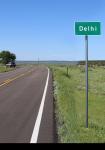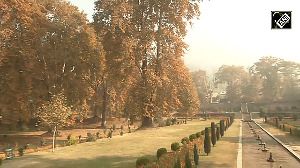China on Friday acknowledged for the first time that police had shot at and wounded four rioters in a Tibetan-inhabited area in southwestern Sichuan province, where protests broke out after anti-Beijing demonstrations in the restive Lhasa.
Police opened fire and wounded four rioters "out of self defence" after the protesters attacked them with knives and tried to seize weapons in the Tibetan-inhabited Aba County in Sichuan province on Sunday, local public security bureau said.
Quoting the bureau, official Xinhua news agency claimed the rioters continued attacking officers even after warning shots were fired and the wounded men fled in the midst of chaos. Fifteen police vehicles and office facilities were destroyed in the riots.
Shaken by the large-scale protests, China has rushed more troops to Tibet and neighbouring provinces to contain the pro-independence movement and arrested 24 people for "endangering national security" in intensified crackdown.
China has ordered its "largest mobilisation" since the unrest began on March 10, media reports said. About 400 troop carriers and other vehicles were seen on the main road in the Tibetan capital Lhasa.
Monks-led demonstrations had erupted into violence in the most intense protests in the two decades on Friday last, claiming 13 lives. The Tibet regional government said 170 people had "surrendered" for their role in the riots.
The protests had spread to Tibetan-inhabited areas of Sichuan and Gansu provinces, China said on Wednesday admitting for the first time that the unrest went beyond Lhasa.
Shops and government offices were attacked in the counties of Aba, Xiahe, Magu, Lugu and Jone and Hezuo city in southern Gansu. Lhasa, Gannan and Aba are struggling to recover, local officials said.
China, meanwhile, said the Netherlands, Germany, Switzerland and Australia have apologised to it for "failing" to protect Beijing's missions from being attacked, Foreign Ministry spokesman Liu Jianchao said.
Beijing strongly condemned the attack on its diplomatic missions by the "Tibet independence elements" which it said was "well organised and well plotted atrocious acts masterminded by the Dalai clique (groups associated with the Tibetan spiritual leader the Dalai Lama) to split China."
Liu said the attackers broke into the embassies and consulates and assaulted the staff which seriously disrupted the working order of the missions, undermined the dignity of the diplomatic institutions and jeopardised the safety of the lives of the staff.
Police of the countries concerned have stepped up protection for Chinese embassies and consulates and they would deal with the culprits in accordance with law, he said.
International pressure is mounting on China to hold dialogue with the Dalai Lama but Beijing has insisted he must recognise Tibet and Taiwan as parts of China and asked him to undergo a "thorough review of himself" to create conditions for the talks.
The Tibetan leader, living in exile in India, has said he was ready for talks with Chinese leaders and even traveling to Beijing once the violent protests in Lhasa subsided.
China has accused the Dalai Lama of "masterminding" the riots which he denies. The Dalai Lama has said he fears "a lot of casualties" from China's crackdown.





